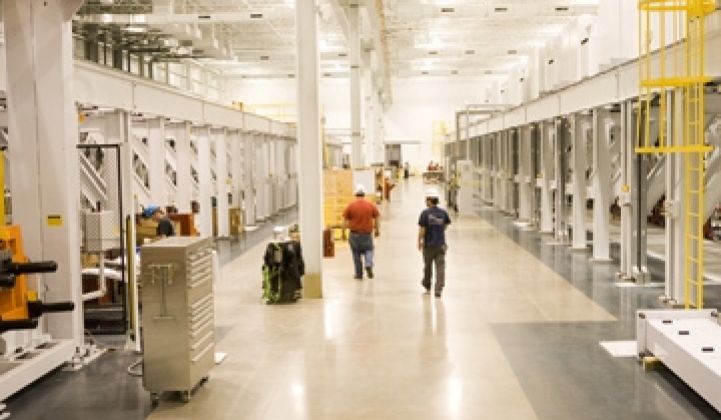United Solar Ovonic (Uni-Solar) plans to let go 400 employees, or 20 percent of its workforce, the latest sign that the company is struggling to weather the economic downturn.
The company, which makes amorphous silicon thin films, said the cuts would include the layoffs it had previously planned as part of its recent acquisition of Solar Integrated Technologies.
News of layoff began appearing Tuesday night, when local media in Greenville, Mich., began getting calls from Uni-Solar employees who got the pink slips that day (see Greenville Daily News andWOODTV8).
Uni-Solar gave notice to about 80 employees at its factory in Greenville, Mich., on Tuesday, confirmed Mark Trinske, vice president of investor relations at Uni-Solar, via email early Thursday. He said the company would issue a press release about the layoffs later in the day. Before the layoff announcement, Uni-Solar had about 1,900 employees overall.
The press release showed up late Thursday, didn't specify which factories, besides the one in Greenville, will be affected by the restructuring plan. Trinske said the cuts will take place at various sites, most of which are in Michigan, the base of Uni-Solar's operations.
Like many other companies in the solar industry, Uni-Solar has struggled amid an economic downturn that has strangled investments in building solar power projects worldwide over the past year. Earlier this year, solar panel manufacturers and their suppliers were reporting steep revenue cuts and even losses.
Uni-Solar had shut down its factories in Greenville and Auburn Hills for about a month between May and June this year.
The market conditions improved in the third quarter of this year thanks mainly to Germany. Germany has a well-established market and policies for subsidizing solar power generation (see Germany Installs 2.34GW, FIT to Decline 9-11% and Solar Market to Decline for First Time Ever).
While other solar companies began to see a boost to their revenues and profit during the summer, Uni-Solar continued to post losses.
The company is part of Energy Conversion Devices, which reported last month a net loss of $11.8 million, or 28 cents per share, for the fiscal first quarter, compared with a net income of $11.8 million, or 27 cents per share. The company had posted a net loss of $17.6 million, or 41 cents per share, in the fourth quarter of fiscal 2009.
The day Uni-Solar gave employees the pink slips, its chairman, Subhendu Guha, appeared at a solar conference in San Francisco and spoke about the fierce competition for limited customers this year.
Guha said manufacturers in China have inflicted pains on the rest of the industry by slashing their prices. He also noted that solar panel makers had been expanding their factories just before the market demand plummeted.
"The relentless pressure is coming from two sides. One is the low-priced products from China," Guha said. "In order to sell the products, you have to lower the price of the systems. It's great for consumers but not for manufacturers. But those with a vibrant business model will survive. Many will not."
Uni-Solar was embarking on a big expansion plan before the credit market collapsed a year ago.
In October 2008, the company said it would build a 120-megawatt factory in Battle Creek, Mich. The company had hoped to start operating the factory by the end of this year.
Uni-Solar has postponed that plan, Trinske said. The factory building is there, but it has no equipment, he said.
"Because we are on a 'demand-driven' expansion, when demand slowed we postponed the continued development of Battle Creek," Trinske wrote in the email. "This new restructuring [in Greenville] does not impact the Battle Creek facility since it has no equipment or employees yet."
Back in 2006, it announced plans to build a 120-megawatt factory in Greenville in two phases. The company was operating a factory in Auburn Hills at the time and was about to open a new factory in the same city soon.
Photo of workers in the Greenville, Mich. plant via Uni-Solar.



